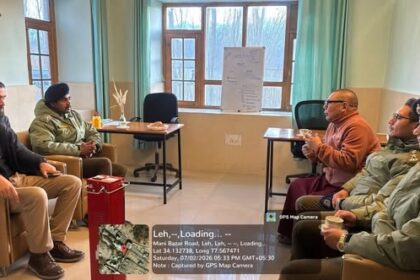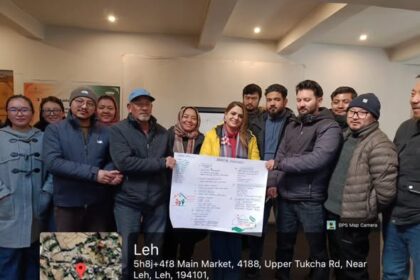BJP Kissan Morcha Leader acuses the administration of his high-handedness.
||Black and White Digital News||
||Tejveer Singh June 15, 2024 ||
JAMMU:Salehar village in Tehsil Bishnah, Jammu, remains engulfed in protests for the second consecutive day as locals, including BJP leaders, vehemently oppose the installation of a proposed waste management plant. Tensions escalated into a scuffle between villagers and police, leading to potential FIRs against protestors.
The protests have gained momentum with BJP leaders strongly opposing the project, citing environmental and health concerns. This has sparked clashes with the Tehsil administration, which reportedly targeted BJP leaders. Villagers and BJP members accuse the administration of high-handedness and neglecting public opinion.
The situation took on political dimensions as Congress leaders voiced support for BJP’s stance, highlighting widespread discontent over the project. Congress leaders praised BJP for addressing public concerns and criticizing the administration’s handling of the waste management plant.
At the center of the controversy is the Tehsildar of Bishnah, whose uncompromising stance has inflamed tensions. Refusing direct communication with media and protestors, the Tehsildar issued a challenge asserting the project’s inevitability despite opposition. This defiance has galvanized protestors, who demand project relocation and public consultation.
Criticism mounts against the Tehsildar’s authoritarian approach, emphasizing the need for transparent decision-making in significant infrastructure projects. Protestors stress public health and environmental sustainability over bureaucratic decisions, calling for community engagement.
The conflict underscores governance challenges and the balance between development and public welfare. As tensions persist, authorities increase police presence to maintain order while monitoring developments closely. The outcome could set precedents for future infrastructure projects, emphasizing inclusive governance practices.
Leave a comment
You Might Also Like
SSP Leh Along with District Officials Visit De-Addiction Centre Leh, Encourage Patients Towards Recovery and Rehabilitation
SSP Leh Along with District Officials Visit De-Addiction Centre Leh, Encourage Patients Towards Recovery and Rehabilitation Leh, Feb 9: Today,…
1 Min Read
Katra Roop Way Bun Kar Rehega MLA Katra Baldev Raj Sharma Ka Bayan Me Jeeta He Isi Promise Pe Hu
Katra Roop Way Bun Kar Rehega MLA Katra Baldev Raj Sharma Ka Bayan Me Jeeta He Isi Promise Pe Hu…
0 Min Read
PDP Na BJP K Sath Alliance Na Kiya Hota Aaj Article 370 Bhi Hota Aur J&K Ki Halat Bhi Behtar Hoti Nc Senior Leader Mubarak Gul
PDP Na BJP K Sath Alliance Na Kiya Hota Aaj Article 370 Bhi Hota Aur J&K Ki Halat Bhi Behtar…
0 Min Read
Implementation of Rural Development Schemes Concludes at Leh
Implementation of Rural Development Schemes Concludes at Leh Leh, February 07, 2026: The three-day State-Level Training Programme on Effective Implementation…
2 Min Read









